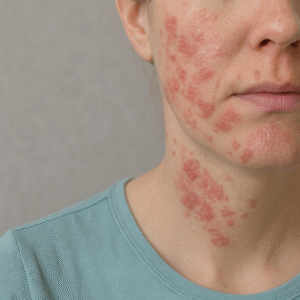Could JAK Inhibitors Help Your Skin Condition?
There’s a new molecule making waves in dermatology: JAK inhibitors. Let’s take a closer look at how these medicines work, and why they’re opening up new possibilities for conditions like eczema, psoriasis, alopecia areata, and vitiligo.
The Cell Phone Analogy: Understanding Your Body’s Communication System
To understand JAK inhibitors, imagine your body is like a bustling city, and your cells are like people trying to communicate with each other. But instead of phones, they use chemical messengers called cytokines.
Here’s how it normally works:
The Message: Your immune system detects a problem and wants to send out an “alert” message.
The Messenger: Cytokines carry this message, like a delivery person carrying a package.
The Doorbell: When cytokines reach their target cell, they ring the “doorbell” by attaching to receptors on the cell’s surface.
The Relay System: Inside the cell, there are special messengers called JAK proteins (think of them as the household staff who answer the door).
The Response: JAK proteins take the message and deliver it to the cell’s “command center” (the nucleus), which then decides what action to take – usually inflammation, cell growth, or immune responses.
This system works perfectly when you have a real threat, like an infection.
But in conditions like eczema, psoriasis, alopecia, and vitiligo, this communication system gets stuck on “high alert” mode, sending constant inflammatory messages even when there’s no real danger- The autoimmune state.

What Are JAK Inhibitors? The Volume Control for Your Immune System
JAK inhibitors are like having a volume control for your body’s inflammatory response. They don’t shut down your immune system entirely – they just turn down the volume on the overactive signals that are causing your skin problems.
Think of it this way: if your immune system is like a smoke alarm that keeps ringing when you’re just cooking dinner, JAK inhibitors don’t remove the smoke alarm (you still need it for real fires!). Instead, they adjust the sensitivity so it only goes off when there’s an actual emergency.
What Your Doctor Will Monitor
JAK inhibitors are generally safe, but like any medication, they require some monitoring:
- Blood tests: Regular checks to monitor your blood counts and liver function
- Infection screening: Since JAK inhibitors can slightly lower immune function
- Skin cancer screening: Increased vigilance for any unusual skin changes
Who Should Consider JAK Inhibitors?
You Might Be a Good Candidate If:
- Traditional treatments haven’t worked well enough: You’ve tried topical treatments, light therapy, or other medications without sufficient improvement.
- Your condition significantly impacts your quality of life: You find yourself avoiding social situations or activities because of your skin
- You prefer oral medication: Some people find pills more convenient than creams or injections
- You have multiple related conditions: If you have both eczema and alopecia, for example, one JAK inhibitor might help both
Taking the Next Step
JAK inhibitors aren’t a magic cure—but they’re a science-driven breakthrough.
The best next step? Talk to your dermatologist. They can guide you through whether JAK inhibitors are safe and right for your unique situation.
Remember, everyone’s journey with skin conditions is different, and what works amazingly for one person might not be the right fit for another.
Dermatology is moving forward with evidence-based solutions that change lives. Today’s progress in medical science is backed by evidence, not guesswork. Place your trust in proven science— always choose science over quackery.
This blog post is for educational purposes only. JAK inhibitors are prescription medications that require medical supervision. Always consult with a certified dermatologist to determine if JAK inhibitors are appropriate for your specific condition and medical history.




